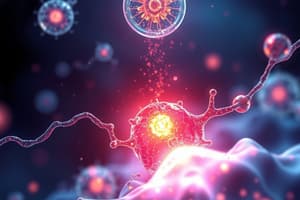Podcast
Questions and Answers
What is the role of the pentose phosphate pathway in the glutathione peroxidase reaction of erythrocytes?
What is the role of the pentose phosphate pathway in the glutathione peroxidase reaction of erythrocytes?
- To produce energy in the form of ATP for the enzyme reaction
- To generate reducing power (NADPH) for the regeneration of reduced glutathione (correct)
- To synthesize proteins needed in the enzyme reaction
- To degrade glucose to produce carbon dioxide
What is the primary function of the pentose phosphate pathway in erythrocytes?
What is the primary function of the pentose phosphate pathway in erythrocytes?
- To provide ribose-5-phosphate for nucleotide synthesis (correct)
- To generate ATP for cell energy
- To store excess glucose as glycogen
- To break down fatty acids for energy production
Why is the pentose phosphate pathway considered essential for erythrocytes?
Why is the pentose phosphate pathway considered essential for erythrocytes?
- Because erythrocytes do not require NADPH for redox reactions
- Because erythrocytes lack mitochondria for other energy-producing pathways (correct)
- Because erythrocytes can produce all necessary nucleotides without this pathway
- Because erythrocytes have abundant glycogen reserves
How does the pentose phosphate pathway contribute to protecting erythrocytes from oxidative damage?
How does the pentose phosphate pathway contribute to protecting erythrocytes from oxidative damage?
How does the deficiency of glucose-6-phosphate dehydrogenase (G6PD) enzyme affect the pentose phosphate pathway in erythrocytes?
How does the deficiency of glucose-6-phosphate dehydrogenase (G6PD) enzyme affect the pentose phosphate pathway in erythrocytes?
Which statement best describes the relationship between the pentose phosphate pathway and red blood cells (erythrocytes)?
Which statement best describes the relationship between the pentose phosphate pathway and red blood cells (erythrocytes)?
Flashcards are hidden until you start studying




